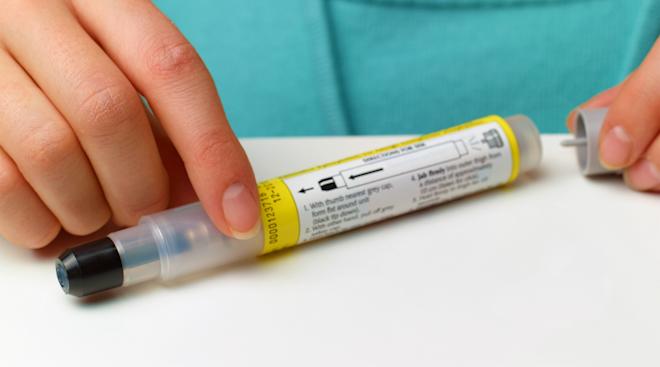This Is What Really Happens When a Kid Has a Severe Allergic Reaction
When your kid has a severe allergy, it affects everything from the food your family eats to the public places you visit. You know how common some allergies are, like a nut allergy, but not everyone realizes. And that can be terrifying.
Julie Ferrier Berghaus knows the feeling. Her daughter, who has a nut allergy, recently underwent a controlled nut challenge with the allergist that resulted in anaphylaxis—a severe and potentially life-threatening allergic reaction. Symptoms can affect several areas of the body, including breathing and blood circulation. The mom was completely taken off guard and didn’t expect anaphylaxis to look the way it did. “It was nothing like they show on TV,” she says. Rattled by the events, she took to Facebook to share the experience in hopes others will learn from it and know how to save a life.
About five minute after consuming 1/10 of a cashew, the little girl started to show one symptom of a reaction—itchy ears. Soon after, she began complaining about a stomach ache and was itchy all over her body, despite no rash being present yet. Doctors decided to administer the first shot from the EpiPen. It seemed to work until about 10 minutes later, when her body broke out in hives although she was showing no other signs of distress.
“It all changed moments later,” the mom shares. “They laid her down quickly, and she then started blacking out. They gave her an albuterol treatment, and another shot of Epi. An IV was started with a dose of solu medrol given.”
After about 10 minutes, the girl started to come around, but even then she had to be monitored for a few hours because anaphylaxis can return in a second round, just as severe as the first time.
“It was nothing like we expected to see. It snuck up on us so unexpectedly and quietly. I expected to see choking, gasping, hear wheezing and see her grabbing at her chest and neck area,” the mom says. “I expected the entire ordeal to be very fast and obvious and dramatic. It was actually very silent, and she didn’t show any severe trouble until very late in the game.”
According to Food Allergy and Research Education (FARE), anaphylaxis is likely to occur when any one of the following happens within minutes to hours after ingestion of the food allergen:
- A person has symptoms that involve the skin, nose, mouth or gastrointestinal tract and either difficulty breathing or reduced blood pleasure, which may be present through pale complection, weak pulse, confusion or loss of consciousness
- A person was exposed to a suspected allergen, and two or more of the following occur: skin symptoms or swollen lips, difficulty breathing, reduced blood pressure or gastrointestinal symptoms, including vomiting, diarrhea and cramping
- A person was exposed to a known allergen and experiences reduced blood pressure leading to weakness or fainting
If you ever believe you or your family member may be experiencing anaphylaxis, FARE urges you to inject epinephrine, usually an EpiPen, immediately and call 911.
“You want to react before she gets this severe! It’s a matter of life and death for her,” Ferrier Berghaus stresses to others.
Please note: The Bump and the materials and information it contains are not intended to, and do not constitute, medical or other health advice or diagnosis and should not be used as such. You should always consult with a qualified physician or health professional about your specific circumstances.
Navigate forward to interact with the calendar and select a date. Press the question mark key to get the keyboard shortcuts for changing dates.




















































